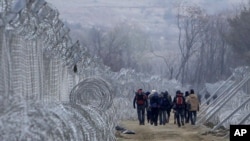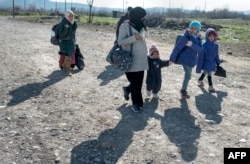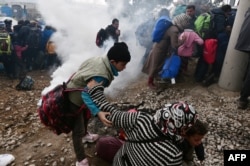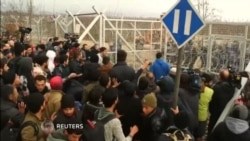The United Nations warned Tuesday that Europe is near a "self-induced humanitarian crisis" because governments are imposing border restrictions and failing to work together as migrants continue to reach the continent.
Adrian Edwards, a spokesman for the U.N. refugee agency, said more than 130,000 people have crossed the Mediterranean this year, most of them reaching Greece. The two-month total is near the figure for the first six months of last year.
Some 24,000 refugees and migrants are in need of accommodation in Greece, with around 8,500 of them massed next to the border with Macedonia.
Macedonian police fired tear gas to push back refugees trying to cross the border from Greece on Monday in the latest clashes between people seeking to move through Europe and governments trying to control the flow of people into their territory.
The UNHCR urged Greece and Balkan countries to quickly act in order to prevent a disaster.
Edwards said European nations pledged last year to accept more than 66,000 refugees who reached Greece, but that so far only 325 relocations have taken place. He said Greece cannot manage the situation by itself.
European Council President Donald Tusk is visiting Austria on Tuesday as part of a five-nation trip to work on how to handle the migrant crisis.
Germany: No plan that abandons Greece
Austria has held firm to its policy to cap the number of migrants it allows into the country. That, in combination with measures set up by others further south along the migration route, has led to bottlenecks at borders. Those restrictions have drawn sharp criticism from human rights groups, the United Nations and others in the EU, particularly Germany.
"When one country defines its limit, another must suffer," German Chancellor Angela Merkel said Monday. "That is not my Europe."
She said an EU solution cannot be done in a way that abandons Greece, where more than 100,000 migrants have already arrived this year.
Tusk will finish his tour in Greece after stops in Slovenia, Croatia and Macedonia. Next week the EU will have a summit with Turkey, a country it has pressured to help stop the flow of migrants from the Middle East into Europe.
Also Tuesday, crews in Calais, France continued dismantling part of a sprawling camp as a group of migrants protested and police kept watch. The site has served as a home to migrants hoping to make their way in Britain. It had grown to house an estimated 6,000 people in December and has since dropped to about 4,000 people.
'A challenge for all of us'
U.S. Secretary of State John Kerry said Monday the refugee crisis is a problem for the entire world, and that nothing would help stem the flow of people more than ending the war in Syria.
"It is a global challenge and it is not somebody else's problem," he said. "It's a test of all of us."
Kerry said the ultimate goal of diplomats like himself is to make sure people can live peacefully in their own country and not feel the need to go somewhere else.
He highlighted the "unbelievable burden" shouldered by Turkey and other Syrian neighbors Jordan and Lebanon. Together, they are currently hosting nearly 4.5 million Syrian refugees. But their struggle to provide for such a big influx has led many people to seek a better life in Europe where governments have been wary of admitting too many newcomers.
Struggling with limited resources to house migrants itself, Macedonia had briefly closed its border last week, only to re-open it but with much stricter controls, allowing only a few hundred people to pass through over the weekend - not enough to alleviate the constant influx of new arrivals as thousands come to the Greek mainland by ferries and immediately head north.
Hundreds of people tried to break through the border fence from Greece into Macedonia on Monday, prompting police to fire tear gas at a group of Syrians and Iraqis.
At least 30 people, including many children, requested first aid, the charity Doctors of the World said.
The crossing is next to the main transit point for refugees traveling towards western Europe. Close to 10,000 people have been stranded in the small transit camp designed to hold 2,500 for brief stays.









